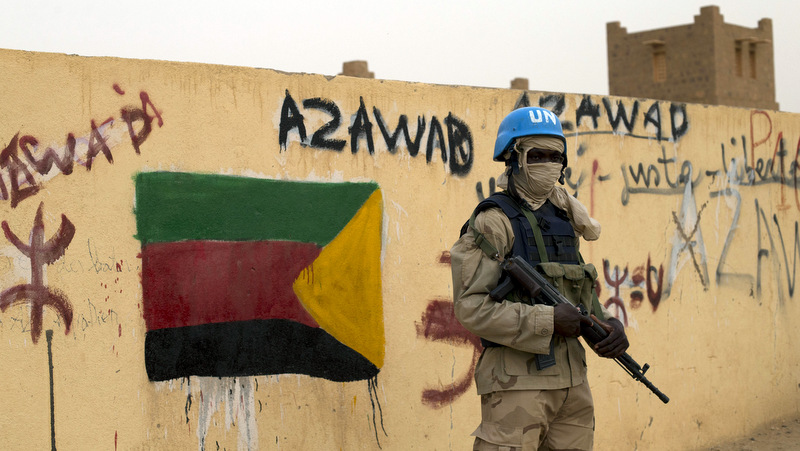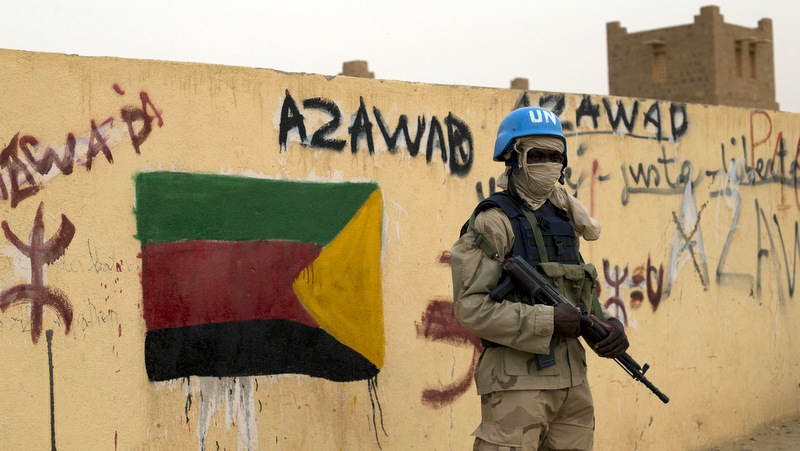
Mali is seeking to restore stability and rebuild following a series of setbacks since early 2012, including a military coup d’état, renewed fighting between government forces and Tuareg rebels, and the seizure of its northern territory by radical militants linked to al-Qaida.
A French-led offensive in January 2013 helped to drive out al-Qaida in the Islamic Maghreb (AQIM), who took control of the north for more than a year, but the problem hasn’t been completely stamped out. With a shaky new government in control of the nation and several rebel movements operating in its territory, Mali is trying to hang on.
“The government is making steady progress in restoring economic stability and basic services, and relaunching the process of long-term development,” Paul Melly, Associate Fellow in the Africa Programme at the Chatham House in the UK, told MintPress News. “The ministerial team is a shrewd blend of technical specialists and heavyweight political figures.”
Melly said another major factor on the road to consolidating the restoration of democracy has been the arrest of Amadou Sanogo, the U.S.-trained military officer who led the March 2012 takeover. He has been indicted on charges related to the alleged murder of soldiers who had been detained for opposing his regime.
“Mali is in an incredibly complicated situation,” Corinne Dufka, Senior Researcher for West Africa for Human Rights Watch, told MintPress. “In a nutshell, I think the situation there has greatly improved over the last year.”
The unravelling of the country was a complex affair. Part of the trail snakes back to the Libyan Civil War in 2011, in which NATO air forces, including the French, tipped the scales, eventually crippling and toppling the Gaddafi regime. In the mayhem that followed, mercenary ethnic Tuaregs returned home to northern Mali overloaded with Libyan weapons. They, in turn, formed an alliance with al-Qaida-linked militias, like AQIM, and launched a rebellion against the central government. Their success was short lived, as they were quickly swept aside by the jihadist factions.
This was similar to Afghanistan before the U.S. war there — the idea, that is, of the Taliban seizing control of the country while also providing safe haven to al-Qaida’s rank and file. In Mali, Tuareg rebels took over, while AQIM carried out operations within Mali’s borders. It was the so-called Talibanization of Mali.
In the midst of all this, years of U.S.-sponsored military-to-military training with Malian forces — meant to strengthen Mali’s military — fell apart, with American-trained Malian units defecting to rebel factions.
Fortunately, things have turned around with the continued presence of the French, but armed religious groups have returned.
“The presence of armed Islamists in the north is up,” Dufka said. “That continues to be a real worry.”
Since the French drove out the religious-based fighters last June, Malians elected ex-Prime Minister Ibrahim Boubacar Keita in August as their next president in a runoff vote and parliamentary elections that were held in November. Instability still haunts the nation and insecurity plagues the region, though, and Keita has been largely distracted with trying to keep fighting to a minimum in the north.
The government still faces a huge challenge there, Melly said, noting that Keita’s government has yet to negotiate a political settlement with the Tuareg armed groups in the north who want autonomy.
However, disaffected Tuareg’s are just one piece of the puzzle for government officials in Bamako, Mali’s southwestern capital.
“Jihadist groups such as AQIM and MUJAO (Movement for Unity and Jihad in West Africa) can still operate in the north — the Malian Sahara is vast and it would be impossible for any security force to totally control it,” Melly said. “The (Islamic) militants still stage occasional attacks. Their freedom to move around or gather in force is much reduced compared with the situation before the French led military intervention. But the process of restoring full security to northern Mali will be a gradual one.”
Earlier this month, French and Malian forces killed about “10 suspected Islamist fighters during an operation in northern Mali’s mountainous Adrar des Ifoghas region,” Reuters reported.
The National Movement for the Liberation of Azawad (MNLA), another rebel movement, is still strong, but it is negotiating with the government, Melly said, as the group is working toward inclusion in the country’s political process.
“It would not make sense for the MNLA or other Tuareg autonomist groups to launch a new military campaign against the government forces,” Melly noted.
The rebuilding of the Malian army has made good early progress, according to Melly. But he observed that there is a long way to go. Security in the north is still heavily reliant on the French military and the U.N.’s 6,000-strong peacekeeping force, MINUSMA, which plans on raising force numbers in coming months to more than 12,000.
With the French drawing down forces from the country, though, can Mali’s government stand on its own? Can MINUSMA fill the void?
Rudy Atallah, nonresident Senior Fellow for the Atlantic Council’s Africa Center, told MintPress that they can’t.
“MINUSMA is still not up to snuff,” Atallah said. “There are reports that MINUSMA is not doing enough to protect the citizens in the north. … And the Tuaregs don’t want to give up their weapons right now because there are still armed Islamists roaming around.”
Atallah said if, for example, the Tuaregs do lay down their arms, they will be left vulnerable to AQIM, MUJAO and the Malian military, who target them routinely.
“There has been some movement in the right direction,” Dufka, the HRW researcher, said of the ongoing negotiations between the government and Tuareg groups. “But I think progress is lagging.”
General security is a persistent problem, since the country has so many armed groups operating throughout the country.
“Security-wise, Mali can never do it by itself,” Atallah continued. “Their military needs a lot of work. … So because of that, they need outside help and that’s why MINUSMA is there. But right now, there’s nothing heavy proactive for MINUSMA to do or certain individuals to go after.”
Corruption is also endemic, Atallah said, which keeps Mali mired in its own undoing. Because of this, northerners who have fought for factioned autonomy for years, feel nothing has changed.
“It’s the same old corruption from the inside — the inside of the apple is rotten,” Atallah said. “And the Islamists are trying to come back … they go into Mauritania and Niger to hide out.”
That could be trouble for both Mali and the West, which wants a more secure Western Africa, especially in the Sahara and Sahel regions. As the French pull out, observers will watch to see if the U.N.’s peacekeeping force can be influential in staving off another takeover of the country.
Meanwhile, poverty continues to make Mali dependent on foreign aid. With food insecurity issues also persisting throughout parts of the country, the central government will remain in a vulnerable situation.
Eleven non-governmental organizations voiced their concerns over food scarcity in northern Mali, which is at particular risk, in a January statement, IRIN News reported on March 3.
“Sally Haydock, WFP country chief, points out that Mali is now into ‘its third year of crisis,’” reported IRIN. “The effects of the 2011-2012 drought were exacerbated by the onset of conflict in January 2012, leaving many people out of work and unable to plant.”
Corruption eats Mali from the inside, leaving the country vulnerable to coups. In Transparency International’s 2013 Corruption Index, Mali scored a 28 out of 100 and ranked 127 out of 177 countries listed.
It remains to be seen whether Keita’s former position as prime minister benefits the country in his current position as president. He is apparently known as “Kankeletegui,” or “a man of his word” in the Bambara language. A BBC report in August asserted that Keita advocates a tough approach to rebels in the north and has promised to root out corruption.
However, before Sanogo, the coup leader, was arrested, he was promoted to the new rank of Lieutenant-General by the newly-elected Malian government, according to the French press agency, AFP. His appointment sparked outcries from groups like Human Rights Watch.
“Sanogo and forces loyal to him have been implicated in extremely serious abuses, including arbitrary detention, enforced disappearances, attacks against journalists and torture,” HRW said, according to the BBC report.
Acts like promoting Sanogo right away, rather than arresting him immediately, could cause an image problem for whether the West can trust Mali to police itself properly.
But the African Union is trying to help shepherd Mali through its tough transition.
Pierre Buyoya, the current AU High Representative for Mali and the Sahel and the head of the African‐led International Support Mission in Mali, recently said the central government needs to get negotiations with armed groups in the north out of the way, then move on.
“We are really encouraging Mali to (begin) negotiations with armed groups with the aim to find a lasting solution to the conflict in the North,” Buyoya, the former president of Burundi, told Voice of America in January. “Once this is done, Mali could then be a stable country and take profit of all the opportunities it has inside its borders, and all the opportunities in the region.”
Insecurity and poverty will always be a part of the larger problem with Mali. Maintaining stable institutions in the judiciary, security forces and military, and executive branches of the government will predict how Mali rides out its future, Dufka, the HRW researcher, said.
A corrupt, centralized southern government administering a land dominated by desert will always have trouble monitoring its thousands of miles of borders, no matter how many troops the U.N. devotes to a peacekeeping mission.
“For the French-led peacekeeping assistance to be considered a success, Mali has to be prepared to deal with the things that led Mali to collapse in the first place,” Dufka said.
Watch The Caspian Report’s primer on the origins of Mali’s Tuareg conflict


